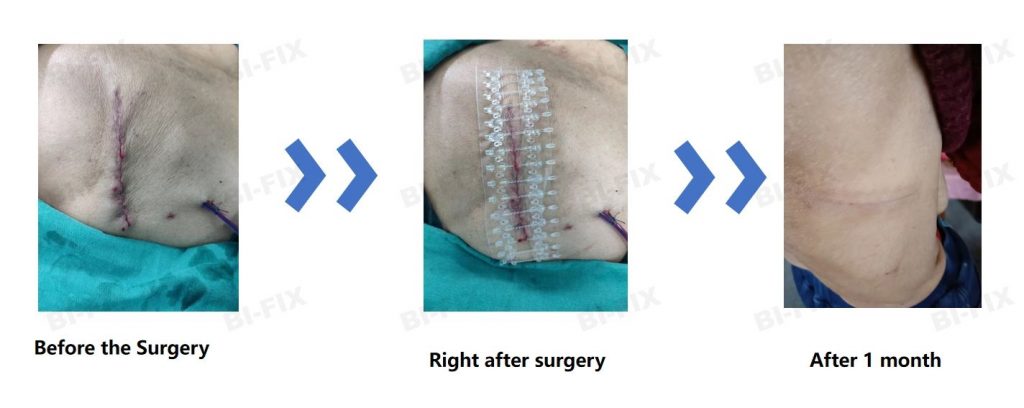BI-FIX non-invasive wound closure device, also known as non-invasive surgical incision closure set or needleless suture device, is a kind of medical skin surface closure device independently developed and produced by Haichuang Medical. Its main feature is to use the skin’s own tension to suture the skin surface non-invasively, avoiding the trauma and scarring problems associated with traditional needle suturing.

The main functions of the BI-FIX Non-Invasive Wound Closure Device include the following:
I. Promote incision healing
1. Reduces incision tension: The BI-FIX non-invasive wound closure device is able to pull the skin in the area around the incision closer while pulling the incision closed, thus effectively reducing incision tension. This feature helps promote healing and reduces the risk of incision splitting due to excessive tension.
2. Reduced closure time: Compared to traditional suturing methods, the BI-FIX device is able to close the incision more quickly, reducing surgical time and patient pain.
II. Reduce scar production
1. Inhibit scarring: The BI-FIX can reduce the damage to the surrounding skin during incision closure, thus reducing the risk of scarring. It also reduces scar growth and widening, resulting in a more aesthetically pleasing healed incision.
2. Reduce scar width: Some studies have shown that non-invasive wound closure device can effectively reduce scar width and inhibit pathological scar proliferation when used after hyperplastic scar and keloidectomy.
III. Reduce the risk of infection
1. Avoid skin puncture: BI-FIX non-invasive wound closure device does not need to puncture the skin for suturing, thus reducing the risk of infection caused by puncture.
2. Promote Wound Healing: BI-FIX also helps to reduce the risk of wound infection by reducing incision tension and promoting healing.
IV. Improving Patient Satisfaction
1. Simple to operate: BI-FIX non-invasive wound closure device is relatively simple to use, which can reduce the workload of medical staff and improve the efficiency of surgery.
2. Aesthetics and comfort: BI-FIX can improve patient satisfaction and comfort as it can reduce scarring and the risk of infection.
V. Wide range of applications
1. Various types of surgery: BI-FIX non-invasive wound closure device is suitable for various types of surgery, including minimally invasive surgery, laparoscopic surgery, surgery for special patients (e.g., AIDS patients, diabetic patients, etc.), children’s surgery, and surgery of orthopedics, obstetrics and gynecology, cardiothoracic surgery and other departments.
2. Different wound shapes and sizes: BI-FIX wound closure is not limited by wound shapes and sizes, and is able to cope with a variety of complex wound situations flexibly.
Types of surgery that BI-FIX non-invasive wound closure device suitable for
BI-FIX non-invasive wound closure device, due to their unique benefits, are used in a wide range of surgery types.
These types of surgeries include but are not limited to:
1. Minimally invasive surgery: With the development of minimally invasive techniques, more and more surgeries can be performed through small incisions or puncture holes. BI-FIX wound closure device can quickly and effectively close these tiny incisions, reducing scarring and promoting healing.
2. Laparoscopic surgery: Laparoscopic surgery, such as laparoscopy and thoracoscopy, requires several small puncture holes in the body surface. BI-FIX can easily close these holes, reducing post-operative pain and risk of infection.
3. Cosmetic Surgery: The use of the BI-FIX wound closure device is particularly important in cosmetic surgery. This is because it minimises the formation of scars and allows for a more natural looking result.
4. Special Patient Surgery: For some special patients, such as AIDS patients and diabetic patients, their wound healing ability may be weak and the risk of infection is high. BI-FIX Non-Invasive wound closure device can provide a safer and more effective suture to help these patients recover better.
5. Paediatric Surgery: In paediatric surgery, children’s skin is delicate and sensitive, so traditional suturing methods may cause more damage to their skin. BI-FIX can reduce the damage to children’s skin, promote healing and relieve their pain.
6. Orthopaedic Surgery: BI-FIX is also frequently used in orthopedic surgeries, especially those involving skin incisions, such as arthroplasty and fracture reduction and fixation. It helps to close incisions quickly and efficiently, promoting healing of fractures and wounds.
7. Obstetrics and gynecology: Skin suturing is also required in obstetrics and gynaecology procedures such as caesarean sections and myomectomies. BI-FIX can provide a more aesthetically pleasing and comfortable closure, reducing the formation of post-operative scars.
8. Cardiothoracic Surgery: These surgeries often require larger incisions, but BI-FIX can still play an important role in the post-operative period, helping to close the incision quickly and promote healing.
Overall, BI-FIX Non-Invasive wound closure device is suitable for a wide range of surgical types, and are particularly common in procedures where there is a need to minimise scarring, reduce the risk of infection and improve patient satisfaction. However, the decision to use a non-invasive device depends on the specifics of the procedure, the patient’s medical condition, and the doctor’s recommendation.
